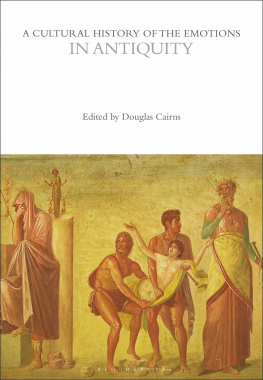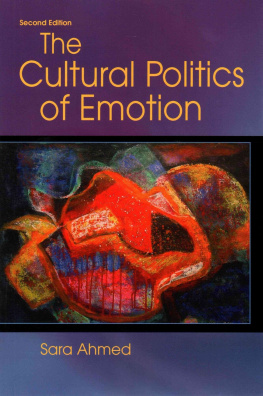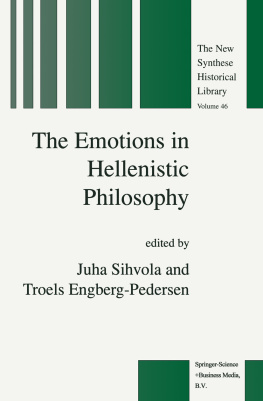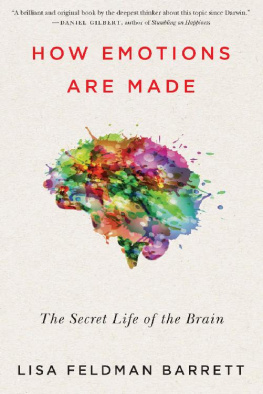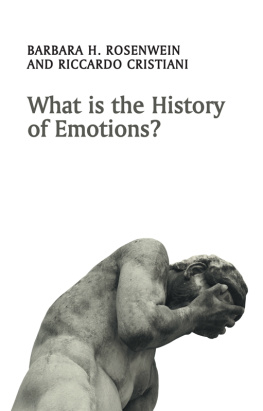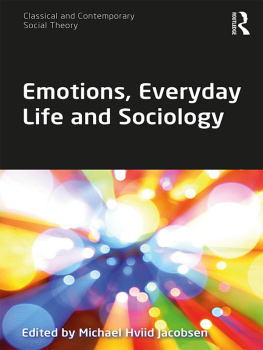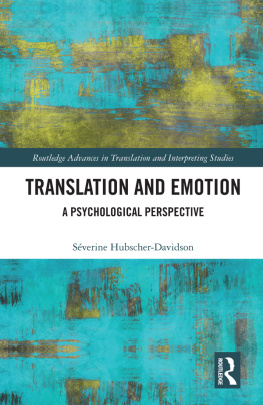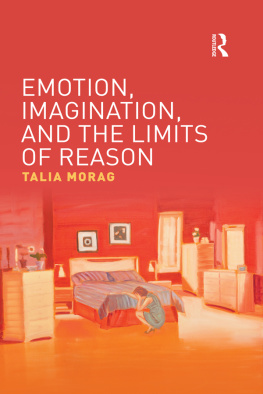The Emotions of the Ancient Greeks: Studies in Aristotle and Classical Literature
THE ROBSON CLASSICAL LECTURES
Williams S. Anderson, Barbarian Play: Plautus Roman Comedy, 1993
Niall Rudd, The Classical Tradition in Operation, 1994
Alexander Dalzell, The Criticism of Didactic Poetry, 1996
M. Owen Lee, The Olive-Tree Bed and Other Quests, 1997
David Konstan, The Emotions of the Ancient Greeks, 2001
The Emotions of the Ancient Greeks
Studies in Aristotle and Classical Literature
DAVID KONSTAN

www.utppublishing.com
University of Toronto Press Incorporated 2006
Toronto Buffalo London
Printed in Canada
ISBN 13: 978-0-8020-9103-1
ISBN 10: 0-8020-9103-2

Printed on acid-free paper
Library and Archives Canada Cataloguing in Publication
Konstan, David
The emotions of the Ancient Greeks : studies in Aristotle and
classical literature / David Konstan.
(Robson classical lectures)
Includes bibliographical references and index.
ISBN 0-8020-9103-2
1. Aristotle. Rhetoric. 2. Aristotle Contributions in psychology.
3. Emotions (Philosophy). 4. Greek literature History and criticism.
5. Emotions in literature. I. Title. II. Series.
B491.P8K65 2006 152.4092 C2005-906754-3
University of Toronto Press acknowledges the financial assistance to its publishing program of the Canada Council for the Arts and the Ontario Arts Council.
University of Toronto Press acknowledges the financial support for its publishing activities of the Government of Canada through the Book Publishing Industry Development Program (BPIDP).
For
ALEXANDRA, ZACHARY,
SADIE BLUE, and ANA
Contents
Preface
How provisional ..., how difficult to reconstruct and how exorbitantly specialized of use, are the tools that in any given case would allow one to ask, What was it possible to think or do at a certain moment of the past, that it no longer is?
Sedgwick and Frank 1995: 23
Il y a une psychologie implicite dans le langage.
Lagache 1947: 1
The fact is that once we name an emotion it takes on a life of its own.
W.I. Miller 1997: 31
The premise of this book is that the emotions of the ancient Greeks were in some significant respects different from our own, and that recognizing these differences is important to our understanding of Greek literature and Greek culture generally. What is more, I argue that the Greeks conception of the emotions has something to tell us about our own views, whether about the nature of particular emotions or the category of emotion itself.
The subject of the emotions has become popular over the last thirty years or so in a variety of fields, including psychology, anthropology, philosophy, sociology, history, and even political science, and more recently still has attracted the attention of students of classical Greece and Rome (e.g., Sorabji 2000, Harris 2001, Nussbaum 2001; on Rome, cf. C.A. Barton 2001, Braund and Most 2004, and Raster 2005). In the past, scholars have tacitly assumed that the Greek terms designating the several emotions correspond more or less unproblematically to our own categories. For many purposes, the resemblance is undoubtedly close enough: discussions of Greek literature retain their validity even if the subtle differences between Greek and modern anger or shame are elided. But beneath the similarities there are striking discrepancies, and these too repay scrutiny. When we speak of Greek anger or love or envy, it is easy to forget that the Greeks themselves did not use our terms, but rather words in their own language, such as org and philia and phthonos. We cannot take it for granted that the Greek words map neatly onto our own emotional vocabulary.
Catherine Lutz (1988: 8) has remarked that the process of translation involves much more than the one-to-one linking of concepts in one language with concepts in another. Rather, the process ideally involves providing the context of use of the words in each of the two languages between which translation is attempted, Ancient Greece is long dead, and it is not possible to interview or observe people in emotional situations. We do, however, have detailed analyses of the emotions by Greek orators and philosophers, and we can see the emotions in action in their brilliant literary and dramatic works. By making use of these sources, we can come closer to perceiving the disparities, sometimes subtle and sometimes conspicuous, between their emotional repertoire and ours. And this in turn, I hope, will shed light not only on their psychology, but on our own as well.
In the first chapter, I review some of the modern controversies over the nature of the emotions, with particular attention to the question of whether the emotions are universal and invariant across cultures, or differ from one society to the next. Given that my purpose in this book is to investigate the divergences between the Greek emotional lexicon and ours, I favour the latter view. But the nature of the disagreement is, I believe, itself enlightening for our understanding both of classical antiquity and of emotional theory today.
In the subsequent chapters, I examine most of the emotions where possible taking Aristotle as the point of departure for my own discussion. In each case, I look not only to what Aristotle or other philosophers have to tell us about the emotion in question, but also to how it functions in contemporary works of literature, focusing chiefly on the archaic and classical epochs (roughly, the eighth to third centuries BC). Above all, as I have said, I am interested in the ways in which the Greek emotions fail wholly to coincide with their nearest congeners in modern English. My discussions accordingly tend to concentrate on literary passages that are particularly revealing of these differences, rather than offering complete surveys of classical Greek usage in regard to the several emotions (in Greek, path).
Not all the emotions, moreover, present one and the same kind of problem for analysis. Sometimes the overlap with modern concepts is greater, for example in the case of love, sometimes less, as with anger. There are instances in which there is apparently no corresponding term in one language for what seems to be a basic emotion in the other: such is the case, I argue, with the modern idea of romantic jealousy an emotion that is not part of Aristotles inventory. In another case, Aristotle omits to discuss a sentiment grief that is central to most modern accounts of the emotions, and here I argue that grief did not fit Aristotles conception of an emotion. Sometimes Aristotles analyses are governed or influenced by his systematic philosophical views and do not provide a wholly reliable reflection of contemporary usage, for example in the case of his notion of indignation (this is true also, in part, of his treatment of anger). Then again, Aristotles discussion of the emotion of gratitude has been almost universally misunderstood by modern commentators, and the burden of my chapter on that topic is a clarification of Aristotles argument, followed by an indication of its import for the Greek concept generally. The shape of individual chapters is thus determined in part by the case at hand. I hope that the pleasures of variety will in some measure compensate for the lack of a strictly uniform treatment of the various emotions.
I conclude this preface with a mention of one aspect of the classical Greek view of the emotions that may seem provocative. so let me state the case in favour of the Greek approach. The Greeks did not conceive of emotions as internal states of excitation. Rather, the emotions are elicited by our interpretation of the words, acts, and intentions of others, each in its characteristic way. Without pausing here to specify just how each emotion is defined (this is the burden of the chapters that follow), I may say that one consequence of this approach is that it is possible to alter peoples emotions by changing their way of construing the precipitating event. If I show you that the insult that has made you angry was unintended, or meant something different from what you understood, or that the enemy you fear has no hostile designs on you, I allay your emotional response. Now, this is not something you can do with dogs or infants. Yes, you can make them feel more secure by holding them, perhaps, or causing them to relax in some other way; you may even show them that you are not threatening or dangerous. But this is not the same as convincing them, by rational arguments, to understand your intentions differently. A second-century AD writer named Achilles Tatius offers an elegant description of the function of words in rousing and allaying emotions in his novel
Next page


